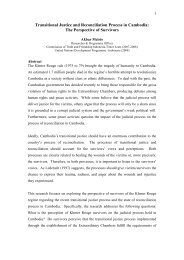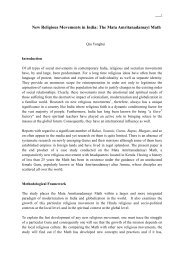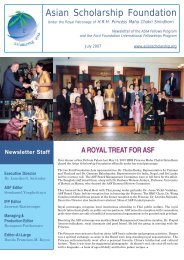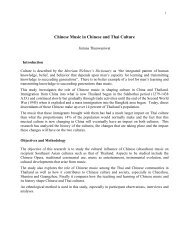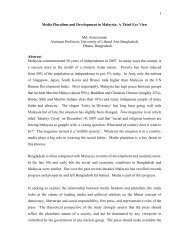Private Sector Participation in Affirmative Action in Malaysia: - Asian ...
Private Sector Participation in Affirmative Action in Malaysia: - Asian ...
Private Sector Participation in Affirmative Action in Malaysia: - Asian ...
You also want an ePaper? Increase the reach of your titles
YUMPU automatically turns print PDFs into web optimized ePapers that Google loves.
Third, the NEP which <strong>in</strong>sisted on compulsory restructur<strong>in</strong>g of shares/ownership saw most<br />
blatant way of simple transfer of wealth to Bumiputeras. Many companies had to allocate<br />
shares to Bumiputeras on very generous terms to see the Malay beneficiary sell the shares<br />
next day on the stock market at a huge profit. Many of the Ch<strong>in</strong>ese firms that f<strong>in</strong>anced<br />
Malay participation would then end up without Malay shareholders. While some of those<br />
who sold their shares did this to set up their own bus<strong>in</strong>ess concerns, but such a patronage<br />
system through compulsory quota often created “paper entrepreneurs” relentlessly <strong>in</strong><br />
search of rent- seek<strong>in</strong>g opportunities and cheap money. Besides, many of them <strong>in</strong>vested<br />
only for short term returns usually <strong>in</strong> the protected domestic sector and rarely <strong>in</strong> the<br />
unprotected <strong>in</strong>ternational export sector (Gomez and Jomo 1997). This also encouraged<br />
most <strong>in</strong>efficient use of prized recourses as it led to high consumption life style and<br />
growth of ‘money politics’ <strong>in</strong> <strong>Malaysia</strong> afflict<strong>in</strong>g every segment of political and<br />
economic systems (Chandra, 1986; Jesudason, 1991). In short, comb<strong>in</strong>ation of state<br />
protection from or domestic and the privileged access to bus<strong>in</strong>ess licenses and funds<br />
through political proximity made life rather easy for some Malay bus<strong>in</strong>essmen, thereby<br />
depriv<strong>in</strong>g Malay entrepreneurs the real gr<strong>in</strong>d<strong>in</strong>g of managerial experience through<br />
‘learn<strong>in</strong>g by do<strong>in</strong>g’ (Gomez and Jomo, 1997). This lack of real bus<strong>in</strong>ess skills and<br />
experience was severely tested dur<strong>in</strong>g the f<strong>in</strong>ancial crisis of 1997 which saw almost all<br />
the major Bumiputera entrepreneurs collapsed or went near bankruptcy as stocks slided<br />
due to volatile economic environment and government tak<strong>in</strong>g away much needed<br />
cushions.<br />
F<strong>in</strong>ally, the implementation of NEP with its strict quantitative quotas became a<br />
mechanical process <strong>in</strong> which companies tried every possible means either to evade or<br />
delay the restructur<strong>in</strong>g by some excuse or others. In large majority of cases, companies<br />
never took up this as their mandate and whenever agreed to do so, they were under<br />
pressures. Therefore, companies apart from resort<strong>in</strong>g to Ali-Baba type, also tried to<br />
manipulate rules to their advantage. For <strong>in</strong>stance, many cases board of directors were<br />
chosen as pliant ones. Even <strong>in</strong> the case of recruit<strong>in</strong>g Bumiputeras to white collar<br />
profession, most them were posted as HR managers 20 . In actual sense these exercise has<br />
20 Inputs received from number of key people from the private sector of <strong>Malaysia</strong>.<br />
28



